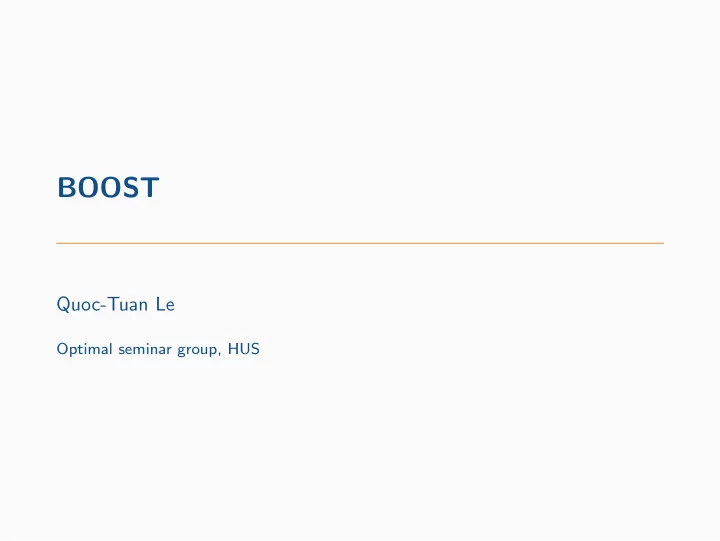

BOOST Quoc-Tuan Le Optimal seminar group, HUS
Overview 1 Introduction to BOOST 2 BOOST’s performance 3 BOOST’s graphic
Introduction to BOOST
What is BOOST Boost provides free peer-reviewed portable C++ source libraries that work well with the C++ Standard Library.
What is BOOST Boost provides free peer-reviewed portable C++ source libraries that work well with the C++ Standard Library. Boost libraries are intended to be widely useful, and usable across a broad spectrum of applications. The Boost license encourages both commercial and non-commercial use.
What is BOOST Boost provides free peer-reviewed portable C++ source libraries that work well with the C++ Standard Library. Boost libraries are intended to be widely useful, and usable across a broad spectrum of applications. The Boost license encourages both commercial and non-commercial use. Boost works on almost any modern operating system, including UNIX and Windows variants.
What is BOOST Boost provides free peer-reviewed portable C++ source libraries that work well with the C++ Standard Library. Boost libraries are intended to be widely useful, and usable across a broad spectrum of applications. The Boost license encourages both commercial and non-commercial use. Boost works on almost any modern operating system, including UNIX and Windows variants. Boost welcomes and thrives on participation from a variety of individuals and organizations. Many avenues for participation are available in the Boost Community.
Get Boost The most reliable way to get a copy of Boost is to download a distribution from SourceForge: 1. Download boost_1_67_0.tar.bz2. 2. In the directory where you want to put the Boost installation, execute tar −− bzip2 − xf /path/to/boost\_1\_67\_0.tar.bz2
Header-Only Libraries The first thing many people want to know is, “how do I build Boost?” The good news is that often, there’s nothing to build. Nothing to Build? Most Boost libraries are header-only: they consist entirely of header files containing templates and inline functions, and require no separately-compiled library binaries or special treatment when linking.
Build a Simple Program Using Boost The following program reads a sequence of integers from standard input, uses Boost.Lambda to multiply each number by three, and writes them to standard output: 1 #include <boost/lambda/lambda.hpp> 2 #include <iostream> 3 #include <iterator> 4 #include <algorithm> 5 6 int main() 7 { 8 using namespace boost::lambda; 9 typedef std::istream_iterator< int > in; 10 11 std::for_each( 12 in(std::cin), in(), std::cout << (_1 ∗ 3) << " " ); 13 }
Build a Simple Program Using Boost Copy the text of this program into a file called example.cpp. Now, in the directory where you saved example.cpp, issue the following command: g++ − I path/to/boost_1_67_0 example.cpp − o example To test the result, type: echo 1 2 3 | ./example
Prepare to Use a Boost Library Binary
Prepare to Use a Boost Library Binary If you want to use any of the separately-compiled Boost libraries, you’ll need to acquire library binaries. Issue the following commands in the shell: cd path/to/boost_1_67_0 ./bootstrap.sh −− help Select your configuration options and invoke ./bootstrap.sh again without the –help option. Unless you have write permission in your system’s /usr/local/ directory, you’ll probably want to at least use ./bootstrap.sh −− prefix=path/to/installation/prefix to install somewhere else. Also, consider using the –show-libraries and –with-libraries=library-name-list options to limit the long wait you’ll experience if you build everything. Finally, ./b2 install
Link Your Program to a Boost Library we’ll use the following simple program that extracts the subject lines from emails. It uses the Boost.Regex library, which has a separately-compiled binary component. 1 #include <boost/regex.hpp> 2 #include <iostream> 3 #include <string> 4 5 int main(){ 6 std::string line; 7 boost::regex pat( "^Subject: (Re: |Aw: ) ∗ (. ∗ )" ); 8 9 while (std::cin){ 10 std::getline(std::cin, line); 11 boost::smatch matches; 12 if (boost::regex_match(line, matches, pat)) 13 std::cout << matches[2] << std::endl; 14 } 15 }
Link Your Program to a Boost Library There are two main ways to link to libraries: 1. You can specify the full path to each library: g++ − I path/to/boost_1_67_0 example.cpp − o example \ ~/boost/stage/lib/libboost_regex − gcc34 − mt − d − 1_36.a 2. You can separately specify a directory to search (with -Ldirectory) and a library name to search for (with -llibrary,2 dropping the filename’s leading lib and trailing suffix (.a in this case): g++ − I path/to/boost_1_67_0 example.cpp − o example \ − L~/boost/stage/lib/ − lboost_regex − gcc34 − mt − d − 1_36
BOOST’s performance
Performance 1 Graph type Algorithm Sparse graph Dense graph LEMON LEMON 3.27s 1.13s LEMON BGL 4.36s 1.07s BGL LEMON 3.55s 1.56s BGL BGL 4.90s 2.08s Table 1: Benchmark results for the largest instances of the shortest path problem combining LEMON and BGL implementations. 1 The benchmark tests were performed on a machine with AMD Opteron Dual Core 2.2 GHz CPU and 16 GB memory (1 MB cache), running openSUSE 10.1 operating system. The codes were compiled with GCC version 4.1.0 using -O3 optimization flag.
Heap performance ❍❍❍❍❍ n 10 100 1000 10000 100000 Type ❍ BinHeap 0.0001065 0.00076785 0.0084887 0.0862004 1.05576 Dheap 9.975e-05 0.0006841 0.0082312 0.0861992 1.05127 FibHeap 0.00011345 0.000767 0.0073001 0.0875208 1.05497 Table 2: Results for the Dijkstra algorithm (one to all) compiling with BOOST heap options.
Heap performance ❍❍❍❍❍ n 10 100 1000 10000 100000 Type ❍ BinHeap 0.0001766 0.0010599 0.0097628 0.123566 1.46321 Dheap 0.0001497 0.00069505 0.00607185 0.0729028 0.819103 Table 3: Results for the Dijkstra algorithm (one to all) compiling with BOOST heap options.
BOOST’s graphic
Graphic 3 3 1 1 2 1 7 2 2 1 4 1 0 1
Graphic g i 3 8 f j 2 7 c h 1 4 a b 6 5 e d
Graphic G F C E H A B D
Graphic www.boost.org anubis.dkuug.dk sourceforge.net www.lsc.nd.edu www.hp.com www.yahoogroups.com www.lam-mpi.org weather.yahoo.com nytimes.com www.boston.com
Graphic Nobel 9 3 McKellar Parry Sound 11 20 30 Dunchurch 12 Magnetawan 20 20 Kearny 10 13 Sprucedale 8 18 15 Novar Rosseau Mactier 5 8 14 9 Huntsville 8 Horseshoe Lake Glen Orchard 30 30 15 Bent River Bracebridge
Recommend
More recommend